If you’re looking to boost self-awareness and strengthen your relationships, these 13 top emotional intelligence books can help. They cover foundational ideas like recognizing and regulating emotions, understanding others, and improving social skills. Some focus on leadership, while others provide quick strategies or neuroscience insights. Each offers practical tools you can start applying today. Keep exploring this list, and you’ll discover ways to develop your emotional intelligence and transform how you connect with others.
Key Takeaways
- The recommended books cover core EI skills like self-awareness, empathy, and relationship management, essential for personal and professional growth.
- Many titles combine scientific insights, practical strategies, and tools such as assessments and coaching for effective learning.
- They cater to various audiences, from beginners seeking foundational skills to advanced learners wanting in-depth understanding.
- Practical techniques include emotional regulation, decoding social cues, journaling, and daily habits to foster emotional maturity.
- The collection emphasizes applying neuroscience, body language, and social psychology to enhance interpersonal skills and self-awareness.
Emotional Intelligence: Why It Can Matter More Than IQ

If you’re interested in understanding how emotional skills can influence success more than traditional intelligence, then “Emotional Intelligence: Why It Can Matter More Than IQ” is a must-read. I found Goleman’s insights eye-opening, showing that emotional awareness and regulation often matter more than IQ for relationships, careers, and societal stability. He emphasizes that these skills are learned through family, school, and community, making them accessible to everyone. The book urges us to prioritize character development and emotional learning, especially in today’s society where emotional deficits contribute to issues like youth nihilism and social unrest. It’s a compelling reminder that emotional intelligence truly shapes our lives more profoundly than raw intelligence.
Best For: individuals interested in enhancing their interpersonal skills, emotional awareness, and societal impact through understanding emotional intelligence.
Pros:
- Provides a scientific and practical perspective on the importance of emotional skills over traditional IQ.
- Emphasizes early education and character development as tools for societal improvement.
- Offers insights into brain physiology and emotional regulation strategies for personal well-being.
Cons:
- Contains some factual inaccuracies and oversimplifications regarding certain psychological concepts.
- Tends to overlook complex social factors like socioeconomic and racial influences on emotional development.
- Fails to address how successful individuals with low emotional intelligence challenge its premise.
Emotional Intelligence 2.0

Emotional Intelligence 2.0 stands out as an ideal choice for professionals and individuals enthusiastic to quickly boost their emotional skills without wading through dense theory. This concise, practical guide emphasizes controlling emotions, building relationships, and enhancing workplace communication. It features a straightforward self-assessment to identify strengths and weaknesses across four key areas: self-awareness, self-management, social awareness, and relationship management. The book offers clear, actionable strategies to improve these skills, making it perfect for those seeking quick, impactful growth. Many readers find its step-by-step approach helpful for enhancing personal and professional relationships, often completing it in just a few days.
Best For: professionals and individuals eager to quickly enhance their emotional intelligence skills for better personal and workplace relationships.
Pros:
- Concise and practical, easy to read and implement quickly
- Focuses on actionable strategies for real-world application
- Suitable for a wide audience, including those new to EQ concepts
Cons:
- Lacks in-depth theoretical background compared to more comprehensive texts
- Limited depth may not satisfy readers seeking detailed emotional intelligence frameworks
- The self-assessment is brief and may benefit from additional or interactive testing options

This book on emotional intelligence stands out as an ideal choice for anyone enthusiastic to develop self-awareness, empathy, and social skills. It offers practical tools, mindset shifts, and real-world strategies that make complex ideas accessible. I found it incredibly helpful for managing relationships, stress, and conflicts in both personal and professional settings. The exercises are easy to follow and focus on boosting emotional regulation, understanding others, and improving communication. Whether you’re a beginner or looking to deepen your emotional skills, this book provides valuable insights and actionable steps to foster emotional maturity and stronger connections. It truly transforms how we comprehend ourselves and interact with others.
Best For: individuals eager to enhance self-awareness, empathy, and social skills to improve relationships and emotional well-being in both personal and professional environments.
Pros:
- Provides practical tools and strategies that are easy to implement.
- Covers core aspects of emotional intelligence in a clear, accessible manner.
- Includes real-world examples that help relate concepts to everyday situations.
Cons:
- Some readers might find certain exercises require consistent practice to see results.
- The book’s focus is broad, which may require reading multiple times to fully internalize concepts.
- It may lack in-depth scientific explanations for those seeking more technical details.
The New Emotional Intelligence

Dr. Travis Bradberry’s *The New Emotional Intelligence* offers a practical, neuroscience-based guide to boosting your EQ. It builds on *Emotional Intelligence 2.0*, focusing on four key areas: self-awareness, self-management, social awareness, and relationship management. With 60 “super strategies,” the book provides bite-sized, actionable tips you can implement immediately. It features The Emotional Intelligence Test™ for honest self-assessment and progress tracking, plus interactive tools like videos and online coaching. Bradberry’s approachable style makes complex concepts easy to understand and apply, helping you develop resilience, improve communication, and strengthen relationships in everyday life.
Best For: individuals seeking practical, science-backed strategies to enhance their emotional intelligence for personal growth, leadership, and better relationships.
Pros:
- Clear, accessible writing style that simplifies complex concepts.
- Offers practical, immediately applicable strategies for everyday situations.
- Includes interactive tools like the Emotional Intelligence Test™ and online coaching for personalized learning.
Cons:
- May lack depth for readers seeking a more rigorous scientific exploration.
- Focuses on simplicity, which might not satisfy those looking for advanced insights.
- Limited discussion on the underlying neuroscience for readers interested in detailed scientific explanations.
Emotional Intelligence Habits
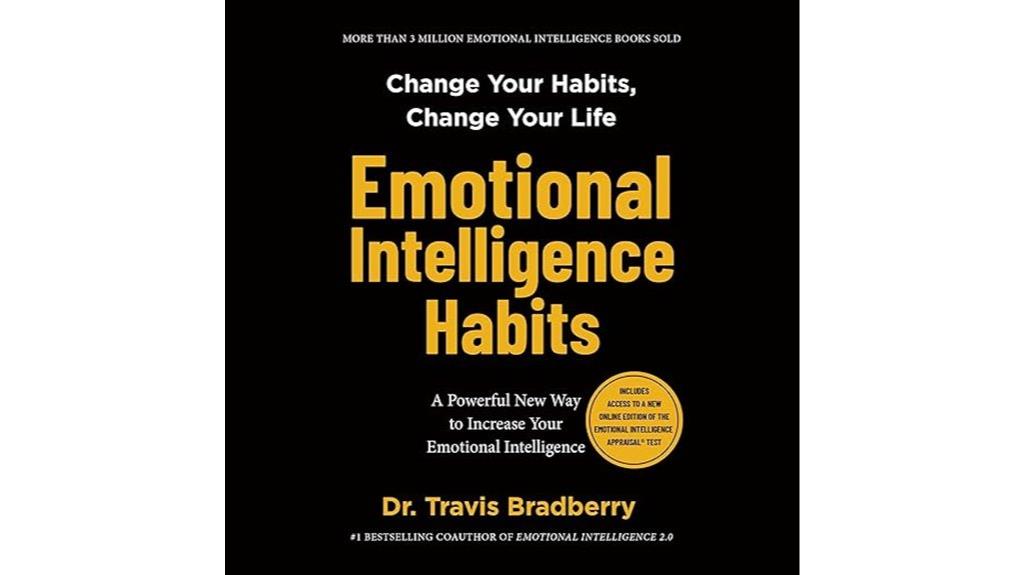
If you’re looking to incorporate practical habits that boost emotional intelligence, “Emotional Intelligence Habits” offers a straightforward and accessible approach. This book combines theories with actionable strategies, making it easy to steer through daily routines. I found its clear advice, relatable examples, and systematic organization helpful for gradually improving emotional skills. The habits it suggests can lead to healthier relationships, better emotional regulation, and a more positive outlook. Many readers, including myself, consider it a valuable resource for navigating emotions and fostering self-improvement. Its practical focus makes it a useful guide for consistent personal growth.
Best For: individuals seeking practical, accessible strategies to enhance their emotional intelligence and improve personal and professional relationships.
Pros:
- Combines theoretical concepts with actionable habits for easy implementation
- Clear, relatable examples and systematic organization support gradual growth
- Widely praised for inspiring positive change and fostering self-awareness
Cons:
- Some readers with prior knowledge may find the content superficial or repetitive
- The initial assessment tool may be less comprehensive than more in-depth diagnostics
- Lacks detailed guidance on how to fully achieve each habit for those seeking deeper mastery
Master Your Emotions: Practical Guide to Overcome Negativity
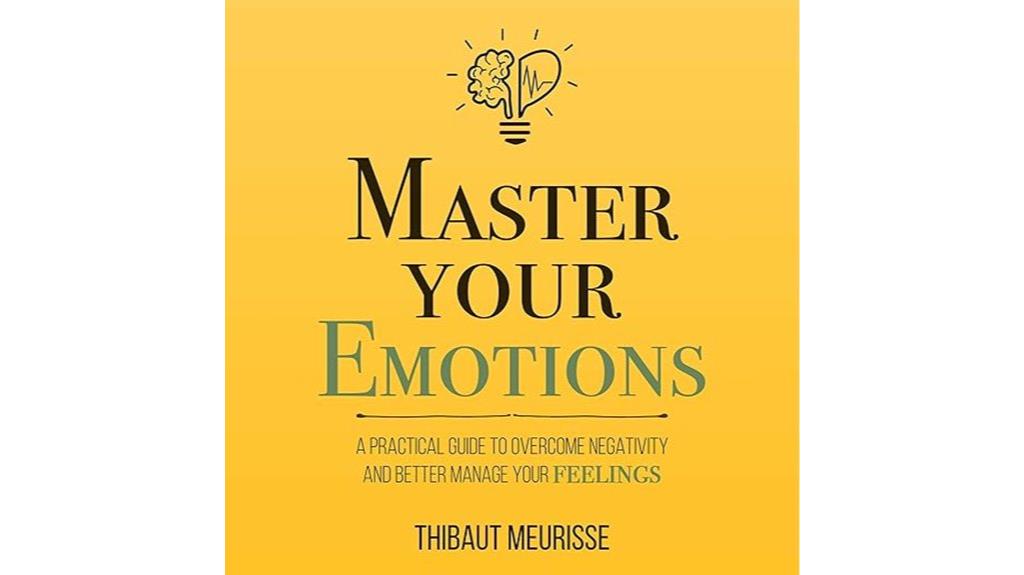
Master Your Emotions is an essential guide for anyone looking to effectively manage negativity and build emotional resilience. I’ve found its practical strategies invaluable for recognizing, understanding, and regulating feelings like anxiety, anger, and stress. The book emphasizes self-awareness and mindfulness, encouraging reflection through journaling and exercises that uncover emotional triggers. Its core formula—“interpretation plus identification plus repetition”—helps analyze and control reactions. By understanding spontaneous versus created emotions and questioning negative interpretations, I’ve learned to reduce defensiveness and suffering. Applying these techniques has transformed my emotional responses, strengthened my mindset, and boosted my overall well-being.
Best For: individuals seeking practical tools to manage negative emotions, enhance self-awareness, and build emotional resilience for personal growth and improved well-being.
Pros:
- Provides actionable techniques for emotional self-regulation and mindfulness.
- Emphasizes reflection through journaling and exercises to identify emotional triggers.
- Uses a clear core formula to analyze and control emotional and mental responses.
Cons:
- Some readers may find the concepts too simplified or repetitive.
- Requires consistent practice to see long-term benefits.
- May need supplementary resources for deeper understanding of complex emotional patterns.
Emotional Intelligence Book: EQ 2.0 by Brandon Goleman

EQ 2.0 by Brandon Goleman stands out as an essential read for anyone looking to build a solid foundation in emotional intelligence. This book emphasizes how EI is crucial for personal growth, success, and healthier relationships. It breaks down key skills like self-awareness, self-regulation, and empathy, offering practical tests and strategies to improve. I found it eye-opening for understanding my own emotional patterns and managing interactions better. Although some sections could be deeper, it’s a highly engaging and informative resource. For those starting their EI journey, EQ 2.0 provides practical insights that can truly transform how you relate to yourself and others.
Best For: individuals seeking a practical, foundational introduction to emotional intelligence to enhance personal growth and interpersonal skills.
Pros:
- Provides clear, practical strategies and assessments to improve EI skills
- Engaging and easy-to-understand writing style suitable for beginners
- Offers valuable insights into self-awareness, empathy, and emotional management
Cons:
- Some sections may lack depth for advanced learners
- Certain topics, like workplace application, could benefit from more detailed coverage
- Occasional repetition and presentation quality issues may affect readability
HBR Emotional Intelligence Book Set (6 Books)

The HBR Emotional Intelligence Book Set (6 Books) stands out as an excellent choice for professionals seeking a well-rounded, research-backed exploration into emotional intelligence. These books deliver deep insights through well-researched, accessible content that breaks down complex concepts into practical steps. Ideal for those in various fields, such as healthcare and finance, they offer concise articles you can read in about an hour. The series emphasizes scientifically grounded observations on human behavior, helping readers identify unproductive patterns and develop effective strategies. I find these books inspiring and easy to follow, making them a valuable resource for personal growth and enhancing workplace relationships.
Best For: professionals and individuals seeking practical, research-based insights to improve emotional intelligence, personal growth, and workplace relationships.
Pros:
- Well-researched and scientifically grounded content offering deep insights.
- Easy-to-read articles that break down complex concepts into actionable steps.
- Suitable for a wide range of professionals, including medical and financial fields, for personal and team development.
Cons:
- Not designed as an introductory series; better suited for those with some prior knowledge or experience.
- Some content may serve as an overview, encouraging further study for a comprehensive understanding.
- May be less engaging for readers seeking highly detailed or advanced psychological theories.
Permission to Feel
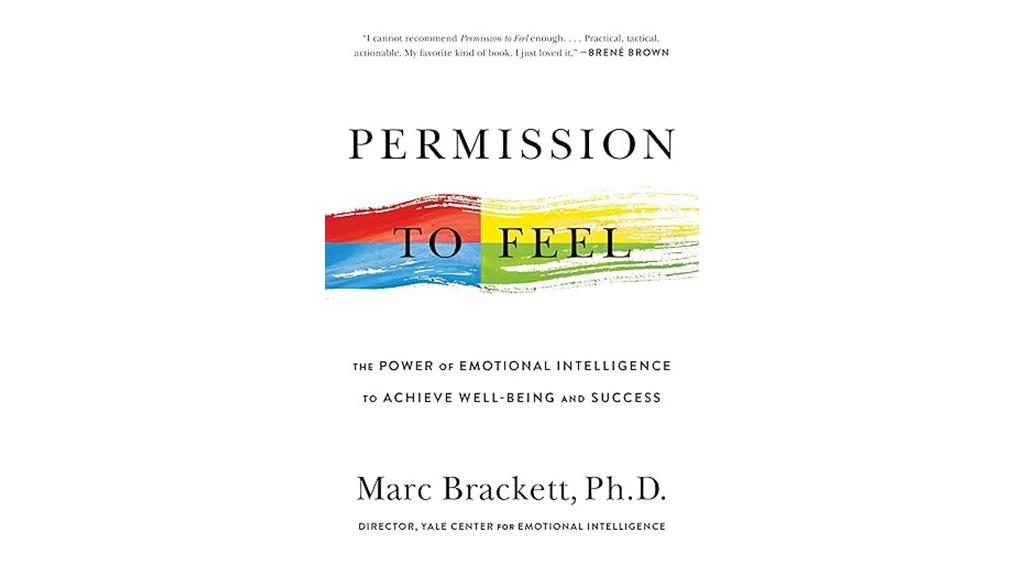
If you’re looking to deepen your understanding of emotions and improve your ability to manage them, “Permission to Feel” offers practical insights grounded in research and real-life stories. Marc Brackett emphasizes that emotions are powerful tools for personal growth, well-being, and better relationships. His RULER system teaches us to recognize, understand, label, express, and regulate feelings effectively. The book shows that emotions are not signs of weakness but sources of strength. By learning to honor and manage our feelings, we can reduce stress, improve communication, and foster empathy—ultimately creating healthier, more connected lives.
Best For: individuals seeking to enhance emotional intelligence, improve personal relationships, and foster a healthier, more empathetic environment in both personal and professional settings.
Pros:
- Provides practical, research-based strategies for recognizing and managing emotions effectively.
- Uses engaging stories and anecdotes to make complex concepts relatable and easy to understand.
- Encourages ongoing learning and community engagement through tools like book clubs and online resources.
Cons:
- May require repeated reading and practice to fully integrate the emotional skills into daily life.
- Some readers might find the scientific references dense or technical without additional context.
- The book’s focus on emotional literacy may seem broad or abstract without specific implementation steps for certain situations.
Read People Like a Book: How to Analyze and Predict Emotions and Behaviors
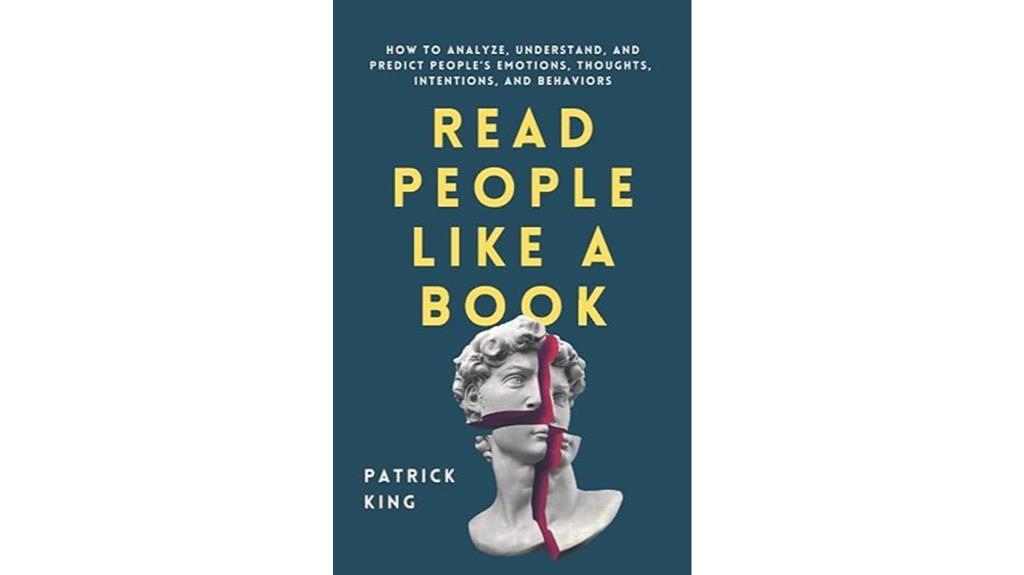
Anyone looking to quickly improve their social intuition and understand others’ emotions will find “Read People Like a Book” a practical starting point. This book is praised for being insightful, entertaining, and easy to follow. Patrick King combines psychology, body language, and observation to give you practical tools for decoding motives and predicting behaviors. It’s effective for social situations like reading strangers, detecting lies, and understanding family dynamics. While some may find it superficial or lacking in depth, it offers accessible strategies for gaining confidence and mastering social cues. Overall, it’s a fun, practical guide perfect for beginners enthusiastic to read people better.
Best For: beginners and casual readers seeking practical, quick insights into understanding and interpreting human emotions and behaviors in social situations.
Pros:
- Insightful and practical guidance that is easy to understand and apply.
- Engaging, humorous writing style makes learning enjoyable.
- Covers a broad range of topics like body language, lie detection, and social cues, providing useful tools for real-world interactions.
Cons:
- Some readers find the content superficial and lacking in depth.
- Limited focus on developing genuine likability and charisma.
- Occasional technical issues such as typos and formatting inconsistencies.
HBRs 10 Must Reads on Emotional Intelligence
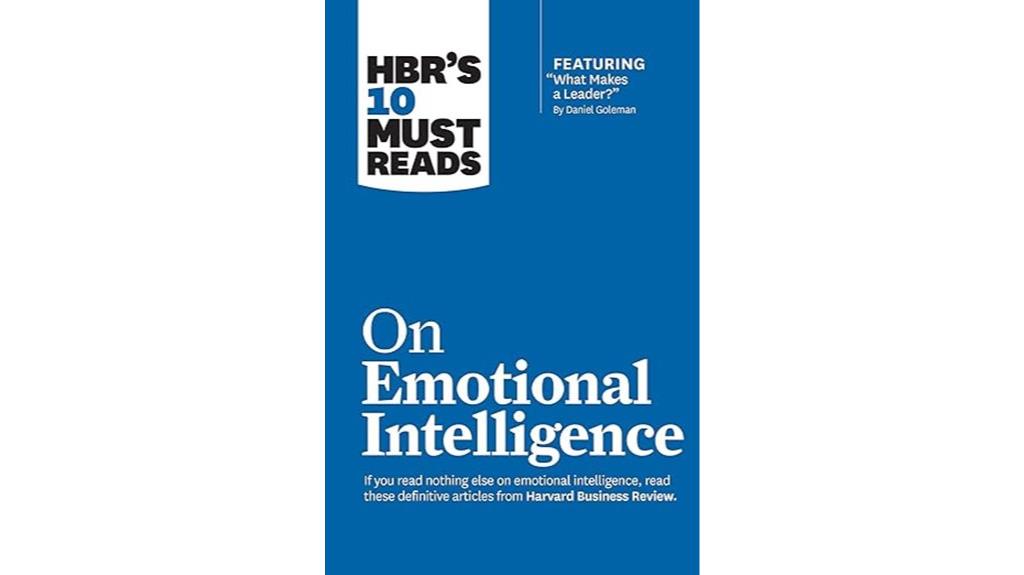
Professionals seeking practical, research-backed insights into emotional intelligence will find “HBR’s 10 Must Reads on Emotional Intelligence” especially valuable. This collection features key articles, including Daniel Goleman’s influential “What Makes a Leader?”, offering diverse perspectives on EI’s role in leadership. It covers topics like resilience, workplace incivility, and giving effective feedback, all with real-world case studies and actionable advice. The book’s accessible, well-structured format makes complex concepts easy to grasp, whether you’re an aspiring or current leader. Many readers report it profoundly improved their management skills and team dynamics, highlighting how emotional maturity often outweighs IQ in leadership success.
Best For: professionals and leaders seeking practical, research-based insights to enhance their emotional intelligence and leadership effectiveness.
Pros:
- Offers diverse perspectives on emotional intelligence with real-world case studies.
- Easy-to-understand, well-structured format suitable for both aspiring and current leaders.
- Provides actionable advice that has been shown to improve management skills and team dynamics.
Cons:
- Some readers may find the management-focused content less engaging or too specialized.
- Physical condition of the book (e.g., minor issues like hair inside the cover) may affect the reading experience.
- The research-heavy approach might be less appealing for casual readers seeking lighter content.
Emotional Intelligence for Leaders: Guide to Effective Leadership
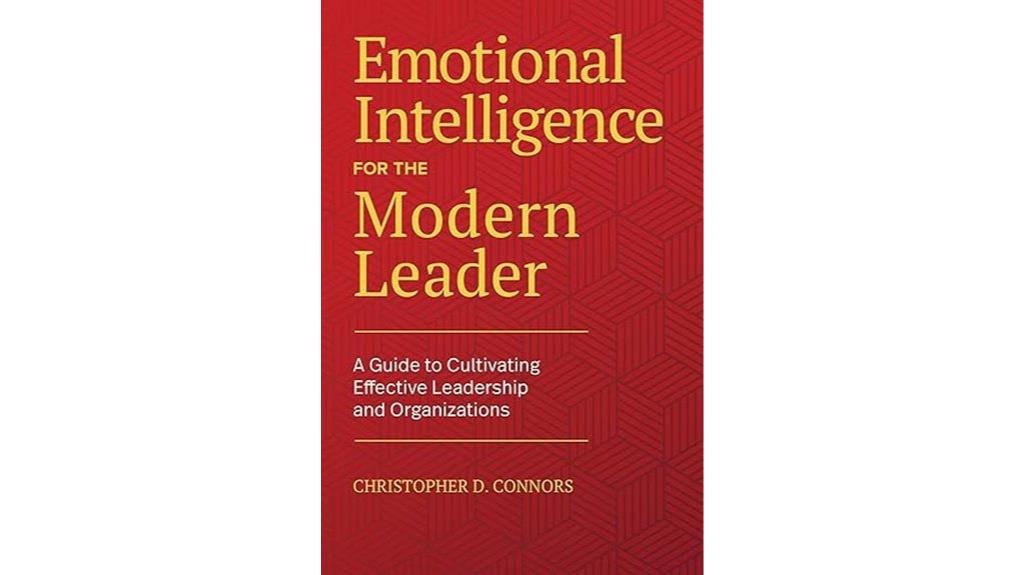
For leaders seeking to enhance their emotional intelligence, *Emotional Intelligence for the Modern Leader* offers practical tools and real-world insights that can make a tangible difference. This book focuses on applying EI in leadership, using reviews, self-assessments, and exercises to develop skills quickly. It stresses that EI is essential for building strong relationships, practicing empathy, and adapting leadership styles like visionary or democratic. The stories and case studies demonstrate how emotionally intelligent leaders foster organizational success and personal growth. Overall, it’s a straightforward, actionable guide perfect for leaders steering through today’s post-pandemic challenges, helping them become more effective and compassionate.
Best For: Leaders, managers, and entrepreneurs seeking practical tools and insights to develop their emotional intelligence for improved leadership and organizational success.
Pros:
- Offers actionable exercises, self-assessments, and real-world case studies that enhance learning and application of EI skills.
- Focuses on practical leadership scenarios, making it relevant for navigating post-pandemic challenges.
- Clear, straightforward writing style that balances self-help with professional development, making complex concepts accessible.
Cons:
- Primarily emphasizes EI’s benefits in daily work rather than exploring EI as a standalone theoretical framework.
- May lack depth for readers seeking a more academic or comprehensive exploration of emotional intelligence.
- Some readers might find the focus on practical application limits the coverage of broader emotional intelligence concepts.
Team Emotional Intelligence 2.0
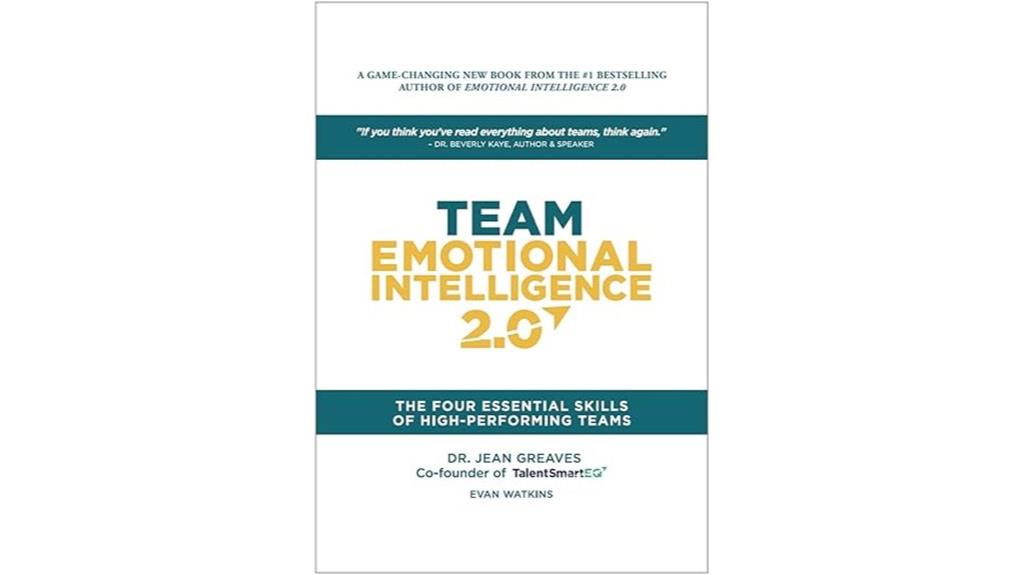
Team Emotional Intelligence 2.0 stands out as an essential guide for leaders and team members committed to enhancing group dynamics through emotional awareness. I’ve found that developing Team EQ is crucial for high-performing teams, promoting respect, trust, empathy, and innovation. It builds on personal EQ skills—self-awareness, self-management, others’ awareness, and relationship management—and applies them collectively. Practical strategies like recognizing emotions, managing responses, and fostering internal trust transform how teams work together. By focusing on these core components, teams become more cohesive, resilient, and productive. Implementing these insights leads to better collaboration, fewer conflicts, and a stronger organizational culture.
Best For: leaders and team members seeking to improve group dynamics, collaboration, and emotional intelligence within organizational teams.
Pros:
- Provides practical, research-backed strategies for developing team emotional intelligence.
- Enhances team cohesion, trust, and resilience leading to better performance.
- Offers real-world examples and step-by-step guidance for implementation.
Cons:
- May require time and commitment to fully integrate strategies into team routines.
- Could be less effective without organizational support or leadership buy-in.
- Some teams might find the concepts challenging to apply without ongoing coaching or training.
Factors to Consider When Choosing Emotional Intelligence Books

When selecting emotional intelligence books, I consider factors like how deep and detailed the content is, ensuring it matches my learning goals. I also look for practical tools and resources that I can apply right away, along with the relevance to my current needs. Additionally, I pay attention to the author’s expertise to trust the insights shared and whether the book suits my experience level.
Content Depth and Detail
Choosing an emotional intelligence book hinges on understanding how much depth and detail it offers. I consider whether it covers the full spectrum of EI topics or focuses narrowly on areas like self-awareness or social skills. I look for thorough explanations, scientific evidence, and practical strategies that go beyond surface-level advice. Including case studies, research references, or real-world examples helps deepen understanding and makes the content more applicable. I also assess if the book balances theory and practice according to my needs—more technical and detailed, or simple and straightforward. Keep in mind, more extensive books often demand prior knowledge, while concise guides suit beginners seeking quick insights. Selecting the right depth ensures the material aligns with your learning goals and keeps you engaged.
Practical Application Focus
To effectively improve emotional intelligence, I focus on books that offer practical exercises, self-assessments, and clear strategies you can implement right away. These resources help translate theory into real-world skills, making growth more tangible. I look for titles that provide step-by-step routines or habits, so integrating emotional intelligence into daily life becomes easier. Relatable examples and scenarios are essential, as they show how concepts apply in personal and professional settings. I also prioritize books that balance useful knowledge with actionable tools, ensuring you can put ideas into practice immediately. Additionally, supplemental resources like online tools or coaching options can reinforce learning and support ongoing development, making the journey toward better emotional intelligence more effective and sustainable.
Target Audience Relevance
Selecting the right emotional intelligence book depends heavily on identifying your specific needs and background. Consider whether the book is designed for beginners or advanced learners to match your current knowledge level. Think about your focus—are you seeking personal growth, improving workplace leadership, or strengthening family relationships? Check if it addresses the needs of your target demographic, such as managers, educators, parents, or students, to ensure relevance. Look for books that include real-world examples or case studies aligned with your experiences or industry for practical value. Also, assess if the tone and style suit your preferences, whether you prefer straightforward guides, research insights, or motivational stories. Choosing a book tailored to your context makes your learning more effective and engaging.
Author Expertise and Credibility
When evaluating emotional intelligence books, it’s important to take into account the author’s expertise and credibility. I look for authors with solid backgrounds in psychology, neuroscience, or emotional intelligence research, ensuring they have the qualifications to provide accurate insights. Checking if they’ve published peer-reviewed studies or are recognized by reputable institutions helps verify their authority. I also review their previous works to gauge depth of knowledge and consistency in discussing emotional intelligence topics. Endorsements from credible experts or organizations add further confidence. Additionally, practical experience—such as consulting, training, or working directly with individuals or organizations—indicates real-world understanding. These factors help me identify authors who offer trustworthy, well-founded perspectives essential for meaningful learning.
Learning Tools and Resources
Choosing the right emotional intelligence book involves more than just reading its content; it’s essential to contemplate the learning tools and resources it offers to support your growth. I look for books that include self-assessment tools, quizzes, or exercises to help me measure and track my progress. Supplementary resources like online courses, videos, or coaching can deepen my understanding and make practical application easier. I also evaluate if the book provides actionable strategies, step-by-step guides, or habits I can incorporate into daily routines. It’s important that the learning tools match my current knowledge level — whether I need foundational concepts or advanced insights. Ultimately, I prefer resources that cater to different learning styles, such as visual, auditory, or kinesthetic, to keep me engaged and maximize retention.
Frequently Asked Questions
How Can I Measure My Current Emotional Intelligence Level Accurately?
You’re wondering how to accurately measure your emotional intelligence right now. I suggest starting with reputable online assessments like the EQ-i or MSCEIT, which provide structured insights. Reflect on your interactions, how you handle stress, and your empathy levels. Sometimes, seeking feedback from trusted friends or colleagues can also give you a clearer picture. Remember, understanding your current EI is the first step to growth and improvement.
Are There Specific Books Tailored for Emotional Intelligence in the Workplace?
Imagine emotional intelligence as a guiding compass in the workplace. Yes, there are books tailored for this journey—like *Emotional Intelligence 2.0* by Travis Bradberry and Jean Greaves, which feels like a map for steering workplace relationships. These books offer practical strategies to understand yourself and connect better with colleagues, transforming your work environment into a more harmonious and productive space.
Can Emotional Intelligence Improve Mental Health and Well-Being?
Absolutely, emotional intelligence can substantially improve mental health and well-being. When I develop my ability to recognize and manage my emotions, I handle stress better and build stronger relationships. This self-awareness reduces feelings of anxiety and depression. Cultivating empathy also helps me connect with others, creating a support network. Overall, boosting my emotional intelligence leads to more resilience, balance, and a healthier mindset.
What Are Common Mistakes When Applying Emotional Intelligence Concepts?
Many people think applying emotional intelligence is straightforward, but it’s easy to make mistakes. I’ve found that one common error is overanalyzing emotions instead of simply acknowledging them. Another is trying to change others’ feelings rather than managing your own responses. Don’t forget, emotional intelligence isn’t about perfection but progress. Stay patient, practice self-awareness, and learn from missteps—they’re part of the journey to better interpersonal skills.
How Long Does It Typically Take to See Results From Reading These Books?
You’re wondering how long it takes to see results from reading these books. Honestly, it varies depending on how much you practice and apply what you learn. Some people notice small changes within a few weeks, like better self-awareness or improved communication. For deeper shifts, it might take several months of consistent effort. Stay patient and committed, and you’ll start seeing positive changes in your emotional intelligence over time.
Conclusion
If you delve into these books, I promise you’ll become an emotional genius overnight—able to read minds, defuse conflicts instantly, and command respect effortlessly. It’s like revealing a superpower that turns everyday interactions into moments of mastery. Trust me, mastering emotional intelligence isn’t just a skill; it’s the secret weapon to transforming your life completely. So, start reading now—your new, unstoppable self is just a page away!











